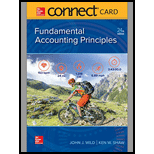
Connect Access Card For Fundamental Accounting Principles
24th Edition
ISBN: 9781260158526
Author: John J Wild
Publisher: McGraw-Hill Education
expand_more
expand_more
format_list_bulleted
Concept explainers
Textbook Question
Chapter 6, Problem 6QS
Perpetual Inventory costing with weighted average
Check End ‘n. 5465
Refer to the information in QS 6-4 and assume the perpetual inventory system is used. Determine the costs assigned to ending inventory when costs are assigned based on the weighted average method. (Round per unit costs and inventory amounts to cents.)
Expert Solution & Answer
Want to see the full answer?
Check out a sample textbook solution
Students have asked these similar questions
I am trying to find the accurate solution to this general accounting problem with the correct explanation.
Can you solve this general accounting problem using accurate calculation methods?
I am trying to find the accurate solution to this general accounting problem with the correct explanation.
Chapter 6 Solutions
Connect Access Card For Fundamental Accounting Principles
Ch. 6 - Prob. 1DQCh. 6 - Where is the amount of merchandise inventory...Ch. 6 - If costs are declining, will the LIFO or FIFO...Ch. 6 - Prob. 4DQCh. 6 - Prob. 5DQCh. 6 - Prob. 6DQCh. 6 - Prob. 7DQCh. 6 - Prob. 8DQCh. 6 - Prob. 9DQCh. 6 - Prob. 10DQ
Ch. 6 - Prob. 11DQCh. 6 - Prob. 12DQCh. 6 - Inventory ownership Homestead Crafts, a...Ch. 6 - QS 6-2 Inventory costs C2
A car dealer acquires a...Ch. 6 - Prob. 3QSCh. 6 - Perpetual: Inventory costing with FIFO P1 A...Ch. 6 - Perpetual: Inventory costing with LIFO Refer to...Ch. 6 - Perpetual Inventory costing with weighted average...Ch. 6 - Periodic: Inventory costing with FIFO P3 Refer to...Ch. 6 - Periodic: Inventory costing with LIFO Refer to the...Ch. 6 - Periodic: Inventory costing with weighted average...Ch. 6 - Perpetual: Assigning costs with FIFO Trey Monson...Ch. 6 - QS6-11
Perpetual Inventory costing with LIFO
Refer...Ch. 6 - QS 6-12
Perpetual: Inventory costing with weighted...Ch. 6 - QS6.13
Perpetual Inventory costing with specific...Ch. 6 - Periodic: Inventory costing with FIFO P3 Refer to...Ch. 6 - Periodic Inventory costing with LIFO P3 Refer to...Ch. 6 - Periodic: Inventory costing with weighted average...Ch. 6 - Periodic: Inventory costing with specific...Ch. 6 - QS 6-18 Contrasting inventory costing methods...Ch. 6 - Prob. 19QSCh. 6 - Inventory errors A2 In taking a physical inventory...Ch. 6 - Analyzing inventory A3 Endor Company begins the...Ch. 6 - Prob. 22QSCh. 6 - Inventory costs C2 A solar panel dealer acquires a...Ch. 6 - Exercise 6-1 Inventory ownership C1
1. At...Ch. 6 - Exercise 6-2
Inventory costs
C2
Walberg...Ch. 6 - Exercise 6-3 Perpetual Inventory costing methods...Ch. 6 - Exercise 6-4 Perpetual: Income effects of...Ch. 6 - Exercise 6-5A Periodic: Inventory costing P3 Refer...Ch. 6 - Exercise 6-6A Periodic: Income effects of...Ch. 6 - Exercise 6-7 Perpetual Inventory costing...Ch. 6 - Exercise 6.8 Specific identification Refer to the...Ch. 6 - Prob. 9ECh. 6 - Prob. 10ECh. 6 - Prob. 11ECh. 6 - Prob. 12ECh. 6 - Exercise 6-13 Inventory turnover and days' sales...Ch. 6 - Prob. 14ECh. 6 - Prob. 15ECh. 6 - Prob. 16ECh. 6 - Prob. 17ECh. 6 - Exercise 6-1E Perpetual inventory costing P1 Tree...Ch. 6 - Exercise 6-19APeriodic inventory costing P3 I...Ch. 6 - Problem 6-1A
Perpetual: Alternative cost...Ch. 6 - Prob. 2APSACh. 6 - Prob. 3APSACh. 6 - Prob. 4APSACh. 6 - Problem 6-5A Lower of cost or market P2 A physical...Ch. 6 - Prob. 6APSACh. 6 - Prob. 7APSACh. 6 - Prob. 8APSACh. 6 - Prob. 9APSACh. 6 - Prob. 10APSACh. 6 - Prob. 1BPSBCh. 6 - Prob. 2BPSBCh. 6 - Prob. 3BPSBCh. 6 - Prob. 4BPSBCh. 6 - Prob. 5BPSBCh. 6 - Prob. 6BPSBCh. 6 - Prob. 7BPSBCh. 6 - Prob. 8BPSBCh. 6 - Prob. 9BPSBCh. 6 - Prob. 10BPSBCh. 6 - Prob. 6SPCh. 6 - AA 6-1 Use Apple's financial statements in...Ch. 6 - AA 6-2 Comparative figures for Apple and Google...Ch. 6 - Prob. 3AACh. 6 - BTN 6-3 Golf Challenge Corp. is a retail sports...Ch. 6 - Prob. 2BTNCh. 6 - Prob. 3BTNCh. 6 - Prob. 4BTNCh. 6 - Prob. 5BTNCh. 6 - Prob. 6BTN
Knowledge Booster
Learn more about
Need a deep-dive on the concept behind this application? Look no further. Learn more about this topic, accounting and related others by exploring similar questions and additional content below.Similar questions
- Can you help me solve this general accounting question using the correct accounting procedures?arrow_forwardCan you solve this general accounting question with accurate accounting calculations?arrow_forwardPlease help me solve this financial accounting problem with the correct financial process.arrow_forward
arrow_back_ios
SEE MORE QUESTIONS
arrow_forward_ios
Recommended textbooks for you
- Principles of Accounting Volume 1AccountingISBN:9781947172685Author:OpenStaxPublisher:OpenStax College
 Cornerstones of Financial AccountingAccountingISBN:9781337690881Author:Jay Rich, Jeff JonesPublisher:Cengage Learning
Cornerstones of Financial AccountingAccountingISBN:9781337690881Author:Jay Rich, Jeff JonesPublisher:Cengage Learning Intermediate Accounting: Reporting And AnalysisAccountingISBN:9781337788281Author:James M. Wahlen, Jefferson P. Jones, Donald PagachPublisher:Cengage Learning
Intermediate Accounting: Reporting And AnalysisAccountingISBN:9781337788281Author:James M. Wahlen, Jefferson P. Jones, Donald PagachPublisher:Cengage Learning - Century 21 Accounting Multicolumn JournalAccountingISBN:9781337679503Author:GilbertsonPublisher:Cengage
 Excel Applications for Accounting PrinciplesAccountingISBN:9781111581565Author:Gaylord N. SmithPublisher:Cengage Learning
Excel Applications for Accounting PrinciplesAccountingISBN:9781111581565Author:Gaylord N. SmithPublisher:Cengage Learning

Principles of Accounting Volume 1
Accounting
ISBN:9781947172685
Author:OpenStax
Publisher:OpenStax College

Cornerstones of Financial Accounting
Accounting
ISBN:9781337690881
Author:Jay Rich, Jeff Jones
Publisher:Cengage Learning

Intermediate Accounting: Reporting And Analysis
Accounting
ISBN:9781337788281
Author:James M. Wahlen, Jefferson P. Jones, Donald Pagach
Publisher:Cengage Learning

Century 21 Accounting Multicolumn Journal
Accounting
ISBN:9781337679503
Author:Gilbertson
Publisher:Cengage


Excel Applications for Accounting Principles
Accounting
ISBN:9781111581565
Author:Gaylord N. Smith
Publisher:Cengage Learning
Chapter 6 Merchandise Inventory; Author: Vicki Stewart;https://www.youtube.com/watch?v=DnrcQLD2yKU;License: Standard YouTube License, CC-BY
Accounting for Merchandising Operations Recording Purchases of Merchandise; Author: Socrat Ghadban;https://www.youtube.com/watch?v=iQp5UoYpG20;License: Standard Youtube License